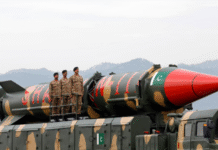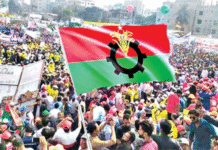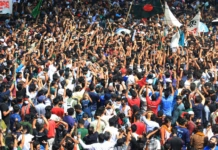Exclusive: Officer Exposes Brutal Killings by Bangladeshi Elite Police Unit RAB

Swedish Radio can reveal a secret recording that uniquely shows how the elite police force Rapid Action Battalion, RAB, in Bangladesh is killing and abducting people. In this sensitive conversation a high-ranking officer exposes details about their violent methods.
På svenska: RAB:s avrättningar exponeras i hemlig inspelning
“If you find him – shoot and kill him, wherever he is. And then plant a weapon beside him.”
This is often the order, says a high-ranking officer. In the conversation he explains how the elite police force in Bangladesh selects which people to kill.
The officer does not know that he is being recorded.
He has been involved in dozens of killings. These are people who they suspect of serious crimes, but who they consider too difficult to convict in a trial, or impossible to rehabilitate.
The Rapid Action Battalion, RAB, is a special unit within the police, made up of both military and police officers. Formed in 2004, it aims to fight serious crimes, like terrorism and drug trafficking in Bangladesh, one of the world’s most densely populated countries.
The dialogue is in Bengali and to protect our sources the translation was done in a country with no connection to the people involved.
He tells how RAB kills selected targets when they least expect something to happen – people sitting at a tea stall or doing other things in their everyday life.
The high-ranking officer tells how the police take bribes from criminals. They use the money to buy weapons to plant next to the people they kill.
People seldom had weapons from the beginning. Planting evidence provides a motive for the killing, that the elite police force acted in self-defense, he explains.
This very sensitive recording is almost two hours long. The high-ranking elite police force officer is clearly repeating, over and over again, statements about killings and enforced disappearances conducted by RAB.
Human rights organizations have repeatedly criticized and documented human rights violations committed by RAB.
Amnesty International is monitoring the developments closely in Bangladesh.
The organization also has close contacts with the families of those killed, abducted and tortured by the elite police force. We let experts assess the unique recording.
The Bangladesh expert Olof Blomqvist at Amnesty International in London says that it is shocking to listen to the recording.
“It is incredibly chilling to hear someone speak so casually and coldly about carrying out these very serious human rights violations. Having said that, we have not been able to confirm these ourselves, but this is something that definitely needs to be investigated”, Olof Blomqvist says.
The experts consider the high-ranking officer very credible, with a good knowledge of many details. Swedish Radio has also used other means to verify the authenticity of the conversation.
“What we hear in this recording are statements that match a pattern of similar violations, which we at Amnesty International and many other human rights organizations have documented over several years, concerning the Rapid Action Battalion”, Olof Blomqvist at Amnesty International says.
After each incident where RAB has killed a person, there are several inquiries, according to the officer, such as how the bullets travelled.
The man’s description provides a unique insight into a combined effort by the authorities into how the events are presented to journalists and the public in Bangladesh.
They use words such as crossfire and claim that RAB had been fired upon, and thereby acted in self-defense.
“What Amnesty International and many other human rights organizations have documented is that ‘crossfire killings’ often is a euphemism for a murder. People who have been killed in these so called shootouts turn up later, with bodies showing clear signs of torture or execution style assassinations”, Olof Blomqvist at Amnesty International says.
RAB is often criticized over abductions, involving people that are caught and later found dead, or who never return home.
The high-ranking officer describes three tricky components to enforced disappearances; to capture the target, to kill him and thirdly, the disposal of the body.
In the conversation, they talk about blocks of concrete being attached to bodies, before they are thrown into a river. The conversation using hard cold words is like a scene out of a horror film.
He describes how the police lie to their intended victims. They say they will drive them to a friend for safekeeping, but instead the police kill them.
The officers must be perfectionists and check on each other.
“Everyone is not an expert on forced disappearances. We have to make sure no clue is left behind. No ID cards that slip-off. We have to wear gloves; we can’t leave footprints behind and have to wear covers on our shoes to prevent that. We can’t smoke during these operations,” the RAB Officer says.
The high-ranking officer says people disappear like this every day. Also innocent people disappear, anyone can be killed in this way, the RAB officer says.
This can be a way of getting rid of political opponents and there are forces that want to remove a large number of people, according to the RAB officer.
He expresses the opinion that this may be a way of controlling population growth. There are so many horrible details in the recording that our translator needs to go out several times, during the translation, for a breath of fresh air.
“Disappearances have skyrocketed since 2009, it is a very widespread problem. Very often, those who are killed or who disappear are activists, or people belonging to the political opposition. No one in the country is safe”, says Olof Blomqvist, at Amnesty International.
“It is something that absolutely has to be looked into more. Quite often, in other cases, we see how authorities are able to use the judiciary to target political opponents or other critics. Unfortunately, the judiciary in Bangladesh has in some ways become a tool of oppression of the authorities”, he says.
Decisions on the fate of those taken by RAB are being made high up, the officer says. In this unique and sensitive recording, the RAB officer also gives examples of how people have been tortured.
He describes a dark room with a lamp in the middle where an arrested man was stripped naked. They hung him in handcuffs, and tied bricks to his testicles. His testicles were almost ripped off by the weight, the officer says. The tortured man fell unconscious and the RAB officer says he did not know if the man was dead or alive.
“It’s very disturbing to hear the details”, Olof Blomqvist at Amnesty International says.
“Bangladesh has a fairly progressive anti torture law, on paper, the problem is that it is very rarely used in practice. Torture continues endemically and it is very rare that the people responsible are held to account”, Olof Blomqvist says.
There is a great concern in the country about how RAB can continue with its practices and the situation is getting out of control, he says.
Only a few people from RAB have been brought to justice for serious human rights violations. Now Amnesty International is calling for a full investigation and those responsible to be held to account.
Source: http://sverigesradio.se/sida/artikel.aspx?programid=83&artikel=6665807









